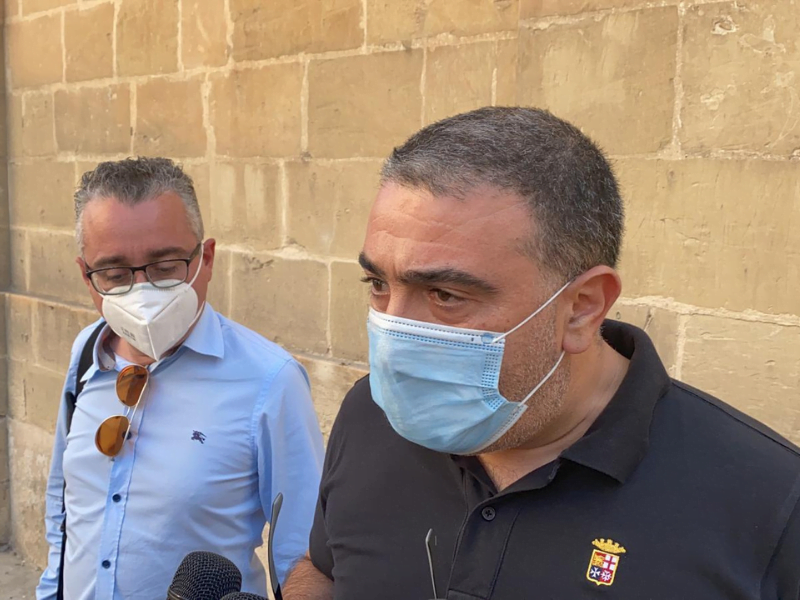Although Keith Schembri is unlikely to be arraigned in court in the next few days, and has now been released on police bail, his day at the lockup – he was taken in in the middle of the night, then released around 20 hours later – showed that the net is tightening.
The court also completed the freezing action on Schembri yesterday with a second so-called “attachment order”, this time targeting more of his family members, including his daughter, and additional companies, including Tillgate Inc, the Panama shell company that was allegedly set to receive injections of funds from 17 Black, owned by the suspected mastermind of Daphne Caruana Galizia’s assassination Yorgen Fenech.
With Schembri taken into the lockup, his lawyers – Edward Gatt and Mark Vassallo – sought to regain some initiative yesterday morning in an urgent court application requesting access to the conclusion of the magisterial inquiry, as well as “material” related to the case. The application landed in the lap of duty magistrate Natasha Galea Sciberras – the same magistrate who conducted the magisterial inquiry in the first place.
The inquiry into the allegations of kickbacks on passport sales between the accountant Brian Tonna and Schembri was concluded a few weeks ago, and it is understood that the police could move against Schembri and arrest him on the basis of the findings of the inquiry.
The night-time arrest itself immediately followed the first decree for an investigation and “attachment” order that froze much of the assets of Schembri and Tonna, as well as their families, and other individuals and entities connected to them.
It is not known what the magistrate decided on Tuesday morning’s urgent application filed by Schembri’s lawyers, but by the afternoon Gatt was telling journalists gathered outside police headquarters that they were “insisting that the conclusions of the magisterial inquiry are made public before Schembri participates in the police interrogation”.
Legal sources have told The Shift that Schembri or his lawyers have no right at law for any part of the report of the inquiry, called the procès verbal, including the conclusions. It’s up to the Attorney General whether to divulge any part of the procès-verbal, including the conclusions, at whatever stage.
The Attorney General might decide to present the procès-verbal during the compilation of evidence if there is an eventual arraignment, or even at a later stage, during the trial itself, if at all.
As to whether Schembri “participates in police interrogations”, as Gatt put it, it’s entirely up to Schembri whether he answers any of the questions put to him, or whether he even signs any statement following questioning or attempt at questioning.
What is clear is that Schembri’s lawyers were trying to get access to as much of the information and evidence in the possession of the police as possible.
In the urgent application, they requested information on the basis of Article 534AF of the Criminal Code, which specifies that the arrested or his lawyers have the right to see any document that might be relevant to a challenge of the legitimacy of the arrest. What this means in practice is that the police are only obliged to show just the documents or information that justifies the arrest.
Then, during the interrogation, the police would also be obliged to show the individual arrested any document pertaining to any question asked.
Yet the lawyers attempted to cast a wider net by pleading that “the importance that the person arrested or accused is given access to material of the case was explained in a clear manner by the First Hall of the Civil Court (Constitutional Jurisdiction)” in a case decided on 30 July by Judge Toni Abela. They then reproduced an excerpt of that sentence that purportedly makes this point.
Yet that excerpt was lifted from the part of the sentence that reproduces the legal application of the lawyer who filed the constitutional lawsuit. It is not part of the considerations or decide (the judgement part of the sentence) of the judge or the court, as indicated in the legal application. In fact, Abela’s judgement does not address that point that Schembri’s lawyers raised.
It seems clear from events that the magisterial inquiry has prepared much of the groundwork in the case, and this leads legal sources to believe that Schembri’s arraignment is a question of when, not if.
At the same time, the fact that he was kept in the lockup for 20 hours, only to be released, suggests that the police have yet to gather more evidence before they press charges.
This also raises questions on the reasons why he was arrested in the first place in the middle of the night and kept for so long. Did this have anything to do with the leak of the so-called freezing order, or any activity on the part of those arrested, that compelled the police to move immediately with the arrest? Did the police search Schembri’s house and premises of his company prior to, or after, arresting him?
The leak could certainly have compromised or interfered with the ongoing investigation at a sensitive juncture, and the Judge who issued the order yesterday reportedly issued another decree requesting the police to investigate the leak. The law specifies that anyone found guilty of such leaks is liable to a fine of around €11,000 and/or imprisonment of up to a year.
As things stand now, the freezing order at least instils a degree of confidence that any existing documentary evidence cannot be adulterated or disposed of, and police bail puts considerable restrictions on Schembri – for example, he cannot go abroad.
But it might be weeks, not days, before the police would have enough to press charges, if any.













Mark Vassallo and Cheryl Azzopardi:
https://daphnecaruanagalizia.com/2015/06/not-so-much-all-in-the-family-as-all-the-family-on-the-state-payroll/